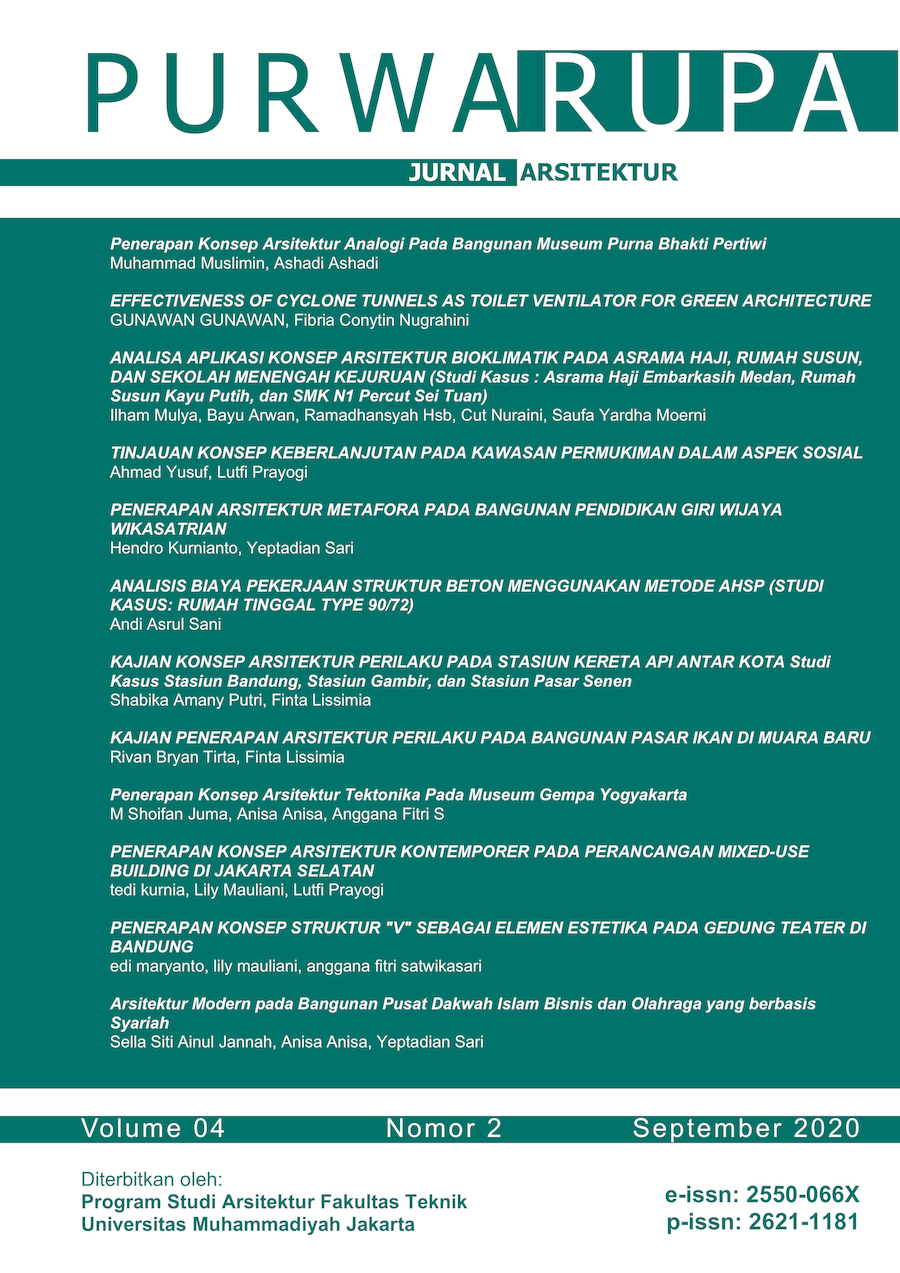TINJAUAN KONSEP KEBERLANJUTAN PADA KAWASAN PERMUKIMAN DALAM ASPEK SOSIAL
DOI:
https://doi.org/10.24853/purwarupa.4.2.23-30Abstract
ABSTRAK. Konsep keberlanjutan diperlukan dalam suatu perencanaan kawasan yang bertujuan menjadikan kawasan tersebut dapat berfungsi jangka panjang. Keberlanjutan sendiri mempunyai pengertian dapat memenuhi pembangunan masa kini tanpa mengorbankan hak-hak masa depan. Keberlanjutan mempunyai tiga prinsip yaitu ekonomi, sosial dan lingkungan. Pada kawasan permukiman aspek yang berperan besar dalam keberlanjutan adalah aspek sosial. Penelitian ini mengkaji konsep keberlanjutan aspek sosial pada kawasan permukiman Summarecon Bekasi di Jawa Barat, Indonesia. Metode penelitian yang digunakan dalam penelitian ini menggunakan metode kualitatif deskriptif dimana diperlukan narasi untuk menjelaskan penelitian ini sesuai dengan fakta dan data yang ada dengan cara sistematis. Hasilnya menunjukkan bahwa aspek sosial di Summarecon Bekasi berjalan secara baik pada urban design, neighborhood design, dan building design. Kata Kunci: keberlanjutan, sosial, kawasan permukiman, Summarecon Bekasi ABSTRACT. The concept of sustainability is needed in an area planning that aims to make the area function in the long term. Sustainability itself means that it can fulfill current development without sacrificing future rights. Sustainability has three principles, namely economic, social and environmental. In residential areas, the aspect that plays a major role in sustainability is the social aspect. This study examines the concept of social sustainability in the Summarecon Bekasi residential area in West Java, Indonesia. The research method used in this study uses descriptive qualitative methods where a narrative is needed to explain this research in accordance with the facts and data in a systematic way. The results show that the social aspects at Summarecon Bekasi run well in urban design, neighborhood design and building design. Keywords: sustainability, social, residential area, Summarecon BekasiReferences
Pitts, Adrian. Planning and design strategirs for Sustainable architecture and profit. Architectural press. Burlington. 2004
Willian, D.E. Sustainable Design : Ecology, Architecture, and Planning. Willey. England. 2007
Undang-Undang Republik Indonesia Nomor 1 Tahun 2011 Tentang Perumahan Dan Kawasan Permukiman
Summarecon Bekasi. www.summareconbekasi.com. Diakses pada tanggal 14 februari 2019,
Peta digital google. www.google.com/maps. Diakses pada tanggal 17 Februari 2019
Carolina. Dkk. Perancangan Kawasan Permukiman melalui Pendekatn Sustainable Urban Drainage Systems di Srengseng Jakarta Barat. Universitas Bina Nusantara 2013
Nasrullah A. Perencanaan prasarana dasar permukiman. Universitas Hasanuddin 2012
Downloads
Published
How to Cite
Issue
Section
License
COPYRIGHT POLICY
The author(s) of an article published in the Jurnal Teknologi retains ownership of the intellectual property rights in work (s).
PUBLISHING RIGHTS
The author(s) of an article published in the Jurnal Teknologi have unrestricted publication rights. The authors give the Jurnal Teknologi the right to publish the article and designate the Faculty of Engineering Universitas Muhammadiyah Jakarta Publishing as the original publisher of the article.
LICENSING POLICY
Journal of Mechanical Engineering and Sciences is an open-access journal that follows the Creative Commons Non-Commercial 4.0 International License (CC BY-NC 4.0), which states that:

Under this license, the reusers must give appropriate credit, provide a link to the license, and indicate if changes were made. Users may do so in any reasonable manner, but not in any way that suggests the licensor endorses users or their use.
Please take the time to read the whole license agreement (https://creativecommons.org/licenses/by-nc/4.0/). As long as reusers follow the license conditions, the owner cannot withdraw these freedoms. The following components are included under this license:
 Attribution: Users must provide appropriate attribution, including a link to the license, and indicate whether or not they made any modifications. Users are free to do so reasonably, but not in a manner that indicates the licensee approves of their usage.
Attribution: Users must provide appropriate attribution, including a link to the license, and indicate whether or not they made any modifications. Users are free to do so reasonably, but not in a manner that indicates the licensee approves of their usage.
 NonCommercial: Users may not use the material for commercial purposes.
NonCommercial: Users may not use the material for commercial purposes.

